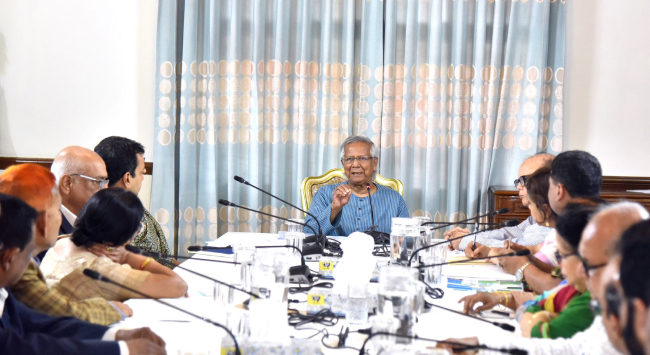Bangladesh’s Political Shift: Challenges and Expectations from Muhammad Yunus’ Interim Government
Imran Ahmed, Charukeshi Karikalan
29 August 2024Summary
Following Sheikh Hasina’s sudden departure and escalating unrest in Bangladesh, the interim government, led by Nobel laureate Muhammad Yunus, has been tasked with restoring stability. However, its immediate challenges include curbing political violence, reviving the economy, building public trust in state institutions and addressing rights violations. Yunus’ administration faces the challenge of maintaining law and order, supporting economic recovery and restoring social services while also preparing for the upcoming elections. The interim government’s success in these areas will be crucial for Bangladesh’s transition towards a stable and democratic future.
Introduction
On 7 August 2024, Bangladesh experienced a significant political transition with the appointment of Muhammad Yunus, Nobel laureate and microfinance pioneer, to lead an interim government. This shift followed a month of escalating unrest, initially sparked by protests over government job quotas and evolving into a broader anti-Sheikh Hasina movement. Hasina’s abrupt departure amid severe unrest has left Bangladesh in a state of turmoil. This paper explores the pressing challenges facing and expectations of Yunus’ interim administration.
The Interim Government and its Challenges
The interim government, led by Yunus and a team of approximately 16 members, most of whom are drawn from civil society and two being student leaders involved in the protests, was established in response to Hasina’s departure. This transition was driven by widespread public discontent and a political vacuum left by Hasina’s sudden exit. Yunus’ appointment has been broadly accepted due to his esteemed reputation and role in civil society. The interim administration’s primary tasks are to restore stability, address immediate concerns and prepare for the elections.
Political Concerns
- Restoring Law and Order: The interim government faces the critical task of restoring law and order amidst recent violence and incidents of mob justice, including attacks on Hasina’s allies and vandalism. The interim administration faces the pressing challenge of addressing these issues to stabilise the capital and rebuild trust in governmental institutions.
- Political Cooperation and Risks of Political Instability: The interim government faces the challenge of navigating a complex and polarised political landscape in order to rebuild confidence in formal political processes and align the interests of disparate and often opposing groups with the success of the democratic process. The Bangladesh Nationalist Party and Jamaat-e-Islami, for instance, have pledged support for the interim government, while Awami League’s activists have staged demonstrations against the interim government and questioned the legitimacy of the political transition.
Economic Concerns
- Restoring Economic Confidence: The interim government faces the gargantuan task of stabilising an economy impacted significantly by the recent unrest. High inflation (11.66 per cent in July 2024) and disruptions in the garment sector – a major economic driver – remain enduring issues and require immediate attention.
- Restoring Public Services: The interim government must address disruptions in public services, such as healthcare and education, which have been paralysed by the social unrest, to maintain public confidence and stability. Ensuring that essential services are operational will need to be a priority.
- Rights, Justice and Accountability: Numerous complaints have been registered against Hasina and her associates over the past few weeks. However, initiating credible investigations and ensuring due process will be key to avoiding politically motivated trials.
- Social Cohesion: The interim government faces the challenge of maintaining social cohesion amidst concerns of violence and discrimination against minority communities. Although there have been attacks on Hindu properties, media coverage, especially from India, has often been alarmist and misleading, with a strong pattern of misinformation.
Elections and Electoral Reforms
- Electoral Timeline and Preparations: Addressing the legal void left by the dissolution of parliament and the need to hold elections within 90 days is crucial. While there have been expressions for extending the interim government’s tenure to ensure a stable environment for elections, there are concerns about avoiding a repeat of 2007 when Bangladesh experienced a two-year military-enforced state of emergency.
Conclusion
The interim government under Yunus faces the challenge of stabilising Bangladesh and preparing the country for a democratic transition. Addressing immediate issues such as law and order, economic stability and the dispensation of justice will be critical. At the same time, working towards a transparent and inclusive electoral process is essential. Balancing governance priorities, while ensuring broad-based support amidst an evolving, polarised and uncertain political landscape, will be no easy task.
. . . . .
Dr Imran Ahmed is a Research Fellow at the Institute of South Asian Studies (ISAS), an autonomous research institute at the National University of Singapore (NUS). He can be contacted at iahmed@nus.edu.sg. Ms Charukeshi Karikalan is a Research Intern at the same institute. She can be contacted at isav32@partner.nus.edu.sg. The authors bear full responsibility for the facts cited and opinions expressed in this paper.
Pic Images: ihcdhaka@Twitter
-
 More From :
More From :
-
 Tags :
Tags :
-
 Download PDF
Download PDF


